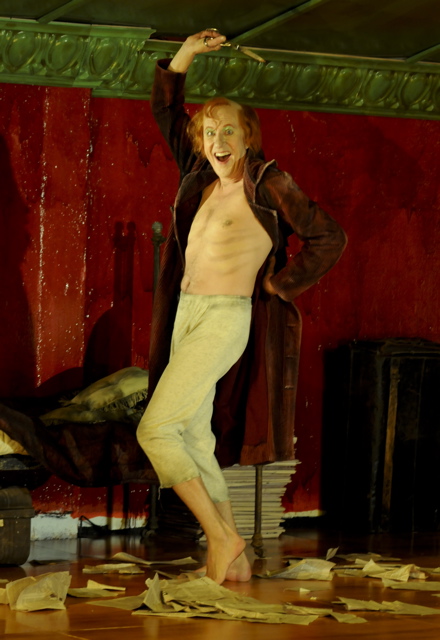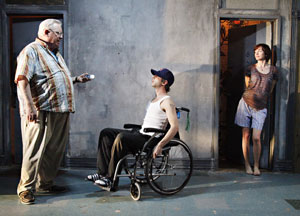DIARY OF A MADMAN *** out of ****
BAM
It's fitting that actor Geoffrey Rush should be cavorting onstage in The Diary Of A Madman just as his latest film The King's Speech triumphs at the Oscars. Rush broke through as an actor some 22 years ago in this show. He and director Neil Armfield adapted the script with David Holman and the wild success of it in Australia made their names. Director Scott Hicks saw Rush and cast him in Shine, the movie that made him a household name and an Oscar winner.

(photo by Heidrun Lohr)
Now he's doing it again with The Kings Speech, in which Rush's work is wonderfully understated. Not onstage, though. In Madman, he gambols and guffaws and plays shamelessly to the rafters -- and that's just during the curtain calls. Rush is the anonymous Poprishchin, a "Clerk of the Ninth Grade" in the government bureaucracy captured so effectively in Gogol's classic. Poprishchin is also, quite clearly, going bonkers. He hears dogs speaking to each other and intercepts their letters. He fantasizes a romance between himself and the daughter of the boss Poprishchin worships. He stacks up newspapers in his rented room, bandies with the maid and finally decides he's the King of Spain and about to be whisked away to his rightful place of authority.
If this Madman doesn't cut very deep, it's precisely because we know so immediately that he's a lost soul. Poprishchin's descent isn't very terrifying if only because he doesn't have so very far to go. So there is no poignancy here, just a lot of stagecraft and fine acting.
Yael Stone is good in multiple roles as both an immigrant worker and the object of his love. Taking her cue from Rush, she mines the humor without ever turning the story into a burlesque -- but also without ever raising more than a passing pity for the poor creature she tries to protect in her own small way.
All the production elements are top-notch, from the quietly off-kilter set of Catherine Martin to the vivid lighting of Mark Shelton, which creates some of the most striking moments in the show as the shadows cast by Poprishchin loom in disjointed fashion over everything Rush does. The music by Alan John is also strong, with the band sitting in the balcony and doing yeoman work in scoring virtually every moment of the play. It was a deliberate choice -- and deliberately wrong - to use the music so continuously, however good each cue might be from moment to moment. A little cartoon-like scoring of comic scenes goes a long way.
Rush is at the center of it all, having a grand time playing his clown, Poprishchin. He holds the stage with authority, flirting with the audience and varying his moods enough to keep our attention on this exhausting fellow. No, he doesn't plumb the depths on this one. Some of the greatest clowns also make you cry as well as laugh. But laughing is accomplishment enough.
THE HALLWAY TRILOGY ** 1/2 out of ****
Rattlestick Playwrights Theater
Rose -- Play 1 *** out of ****
Paraffin -- Play 2 *** out of ****
Nursing -- Play 3 ** out of ****
A trilogy of plays is inherently ambitious and it's natural to demand sweep and greatness so you can shout to the heavens about a major new work, especially when it comes from acclaimed playwright Adam Rapp, who seems one major hit away from becoming the Sam Shepherd of his generation. But the simple truth is that he has delivered two solid, if flawed, plays that exhibit his many talents for character and dialogue. The third -- Nursing -- is a bit of a train wreck with its sci-fi premise and heavy-handed denouement. It's further proof of Rapp's considerable talent, but not the home run you long for Rapp to hit.
But it's the good that has stayed with me, so let's start there. All three plays -- which are set in 1953 (Rose), 2003 (Paraffin) and 2053 (Nursing) and essentially unconnected -- are bursting with talented actors, one of the best casts assembled Off Off Broadway you are ever likely to see. They're testament to the appeal of Rapp's work and their faith in him. The set by Beowulf Borrit (who also did excellent work on The Scottsboro Boys, the best musical of the year) is exceptional. It's so substantial and convincing in every detail, you have no question you're peeking into a run-down lower east side apartment building hallway. The music and sound design are by Eric Shimelonis. Normally, one doesn't think to comment on the sound design -- that's when you know they've done their job. In rare cases, it's flashy work and you tip your hat to it. Here, the sound is seamless. It's a model of efficiency and effectiveness in establishing the era, the time of day and the life outside, all without ever calling undue attention to itself.
And the characters they all get to play with are memorable up and down the line. In Rose, an aspiring actress is trying to track down Eugene O'Neill because he once wrote her a very polite rejection letter after she failed to win a part. Rose refuses to believe when she's told repeatedly that the hateful super of the building is a schlub who has nothing to do with the playwright. Katherine Waterston is very good in the part; I blame the play -- not the actress -- for not making clear exactly how fragile Rose has become. Also wandering through the hallway is a tenant who decides to sleep with the super in lieu of rent, a Russian immigrant who is practicing for a musical audition, a mysterious Mafioso sort of fellow who knows everyone's business and a "character," a beatnik-y sort of fellow (Nick Lawson) who mimes his way throughout the story.

(photo by Sandra Coudert)
In Paraffin, it's the same hallway on the night of a New York City blackout. William Apps (charming as the Russian) is now a drug addict whose own wife (a top-notch Julianne Nicholson) locks him out of her apartment. He's being menaced by thugs who want their money. Now. The super of the first play (Guy Boyd) is now a tenant, an older gay man who picks up a rent boy and buys the kid sneakers but tries to kid himself that it's a romantic date. He's also looking after the bitter paralyzed war veteran Lucas (Jeremy Strong -- so good in New Jerusalem and good again here, especially if you want to see him exposed in every way possible).
In the unfortunate Nursing, it's the same hallway but now the building is a museum. Disease has been eradicated apparently in 2053. But for educational purposes, some people are paid to be infected with horrors like the black death and suffer and vomit for paying customers until they are cleansed and then infected again in a few days or weeks with some new virulent nastiness. Why this would be staged in the hallway of a lower east side tenement instead of one of the many now-useless hospitals that would be both suited to the task and feature a lot more germane to the history of disease is not mentioned.
The set is glassed off and the audience becomes the "audience" given a tour. Sue Jean Kim is the chipper tour guide. She had one of the weakest roles in Paraffin and here similarly has to work with unmotivated goofiness (a melodramatic reading of a Rudyard Kipling poem, for example) and sudden breaks in character where she must emote unnecessarily. Logan Marshall-Green (quite good in Rose) has the lead role of Lloyd, yet another war veteran. He's an excellent actor; it's a shame his strong work is lost in such a muddled play.
You see, some terrorists/activists believe society has lost the ability to show empathy and that we need disease in our lives. They burst into the audience to shout insults, infiltrate the museum and plan to take our hero's infections and loose them on the world. When the play sticks with the conceit of implicating the audience in a character's suffering (which is what all theater does, in a way), it's fine. But the increasingly ludicrous plot intrudes and finally takes over.
I have a dozen or so questions raised not by the complexity of the characters (which is genuine) but by plot twists that should have been tackled and scaled back by a director or dramaturg. These plays were directed by Rapp, Daniel Aukin and Trip Cullman respectively. Maybe they can tell me: why does the Russian so angrily reject his neighbor after a romantic evening? Why does the best friend of the drug addict's wife fail to tell her the pretty crucial information that a menacing thug who knows where she lives is going to chop her husband into a million little pieces? Why does a teacher and former lover who tracks down Lloyd to this museum seem surprised by what's going on -- especially if he's become national news? If you want to infect the world with disease, why would you head to the atomic wasteland of California?
Again and again, the honestly earned fascination we have with these characters is undermined by what the Emperor in Amadeus called "too many notes." Each play flirts with cliche, yet develops strong distinctive people and then swamps them by the end with far more melodrama than is necessary. The complaints come pouring out because you feel Rapp was so close to elevating his game. And don't let the complaints distract you -- the first two plays are one of the best bargains around town. Dollar for dollar you'll see some of the best acting possible in two enjoyable works by a playwright who some day is going to aim for the fences and hit one way past them.
SMALL CRAFT WARNINGS zero stars out of ****
Mother Of Invention at Theatre Row's Studio Theatre
Is there anything more distressing than being onstage and forgetting your lines? Yes, being in the audience when someone is onstage and forgetting their lines. It's like being a parent who has to watch their kid compete -- it's a lot easier to try and fail than sit on the sidelines and suffer. That doesn't make it any easier for Gina Stahlnecker, who plays the lead role in this moribund Tennessee Williams play. She's a pushy beautician who bosses around everyone in sight, shoots her mouth off and generally acts as a life force waking up the denizens of a seedy little bar. One is her lunk of a boyfriend, another is a drunken and washed-up doctor. Then there's the ditzy broad who might just be nuts for real and so on. You get the idea. Losers with dreams or at least losers who once had dreams or at least knew people who had dreams.

(photo by Jason Lung)
Stahlnecker struggled repeatedly to remember her lines and I'll be polite and assume that's what threw everyone else off. Certainly the cast sparked to life when director Austin Pendleton took the stage as a gay screenwriter who prefers rough trade that will beat him up. Instead he's been saddled with a sweet kid (Adam Dodway), who still has a zest for life. When they enter the scene (all too briefly), everyone steps up their game for a moment. The audience can relax because they are commanding enough for you not to be worrying about something like the actors forgetting their lines.
Sadly, they're gone too soon and the play sinks back down into muddied territory. This minimal production (just folding chairs on a black box set) was clearly just a desire to take a look at a Tennessee Williams play and see what we have. Not much, I'm afraid. Pendleton is having a banner year with his smash revival of Three Sisters and a new musical he wrote the book for at Lincoln Center. This will soon be just a bad memory.
THE BROADWAY MUSICALS OF 1921 *** out of ****
Town Hall
The Broadway Musicals series is overseen by Scott Siegel, who brings together Broadway veterans and rising stars to perform some classic and little numbers from bygone eras, devoting each edition to a particular year and sprinkling his intros with trivia and theater lore.
In the past, Siegel has sometimes let these promising evenings drag on. Happily, he's tightened things up and here delivers exactly what you want in just a little over two hours (including a brief intermission). His set-ups are to the point and the talent on display shown off to great effect, thanks in no small part to the musical director Ross Patterson. Numbers were staged simply and effectively and most everyone delivered.
Kate Baldwin of Finian's Rainbow was charmingly pregnant while delivering "Avalon." Kendrick Jones -- so good in The Scottsboro Boys -- is an old school hoofer. His singing was adequate but his dancing on "I'm Just Wild About Harry" and "Everybody Step" was electric. Jones was born in the wrong era. Eighty years ago he would have been a star and worked steadily; every show could use a dancer like him to come in, wow the crowd with a specialty number and maybe take part in a comic bit or two. Liz Lark Brown did well by two novelty numbers but "My Man" was a tad too big for her.
Two stars of Yank! -- coming to Broadway soon -- stood out. Director/choreographer Jeffry Denham charmed on two numbers, especially when he played his ukulele. You gotta have a ukulele when you're doing songs from 1921. And the marvelous Bobby Steggert was playfully innocent on the duet "Just Like You" with Erin Denman and then meltingly good on "Dolly."
Siegel does one show a month. On Monday, March 21 he tackles the Broadway Musicals of 1932. After this show, I wouldn't want to miss it.
THE 2010-2011 THEATER SEASON (ratings on a four star system)
Angels in America revival at Signature *** out of ****
Blood From A Stone ** 1/2
The Broadway Musicals Of 1921 at Town Hall ***
Devil Boys From Beyond **
The Diary Of A Madman with Geoffrey Rush at BAM ***
Driving Miss Daisy **
Elf *
Elling **
A Free Man Of Color ** 1/2
Gatz ***
The Grand Manner **
The Great Game ***
Gruesome Playground Injuries ***
The Hallway Trilogy: Nursing **
The Hallway Trilogy: Paraffin ***
The Hallway Trilogy: Rose ***
The Importance Of Being Earnest ** 1/2
The Interminable Suicide Of Gregory Church *** 1/2
John Gabriel Borkman * 1/2
La Bete ** 1/2
Les Miserables ***
Lombardi **
The Merchant Of Venice *** 1/2
Middletown ***
The Milk Train Doesn't Stop Here Anymore *
Mistakes Were Made ** 1/2
Nixon In China *** 1/2
The New York Idea **
Other Desert Cities **
Our Town with Helen Hunt ***
The Pee-wee Herman Show ***
The Road To Qatar *
The Scottsboro Boys ****
Small Craft Warnings zero stars
The Whipping Man **
Wings **
Women On The Verge Of A Nervous Breakdown **
*****
Thanks for reading. Michael Giltz is the cohost of Showbiz Sandbox, a weekly pop culture podcast that reveals the industry take on entertainment news of the day and features top journalists and opinion makers as guests. It's available free on iTunes. Visit Michael Giltz at his website and his daily blog. Download his podcast of celebrity interviews and his radio show, also called Popsurfing and also available for free on iTunes. Link to him on Netflix and gain access to thousands of ratings and reviews.
